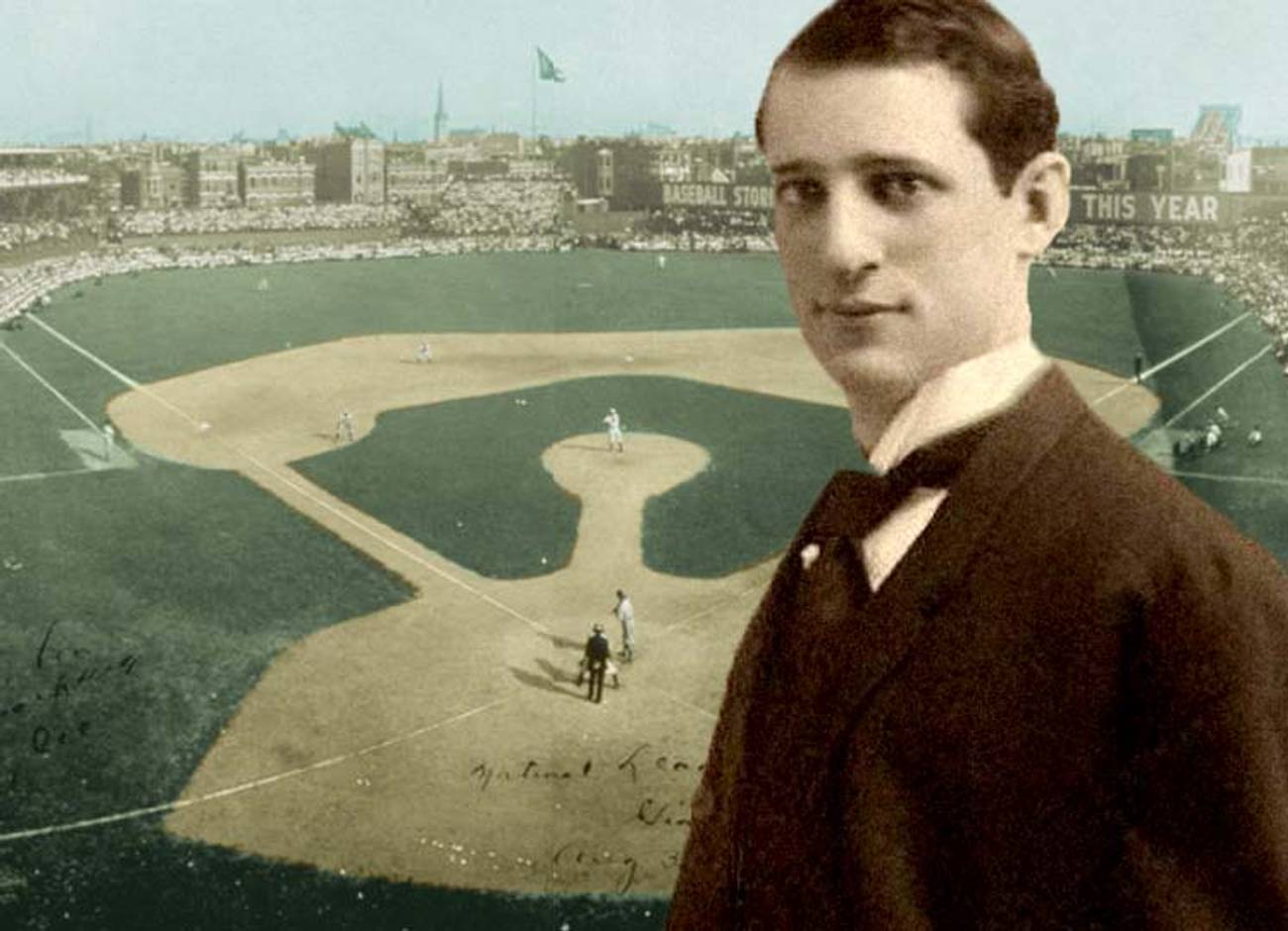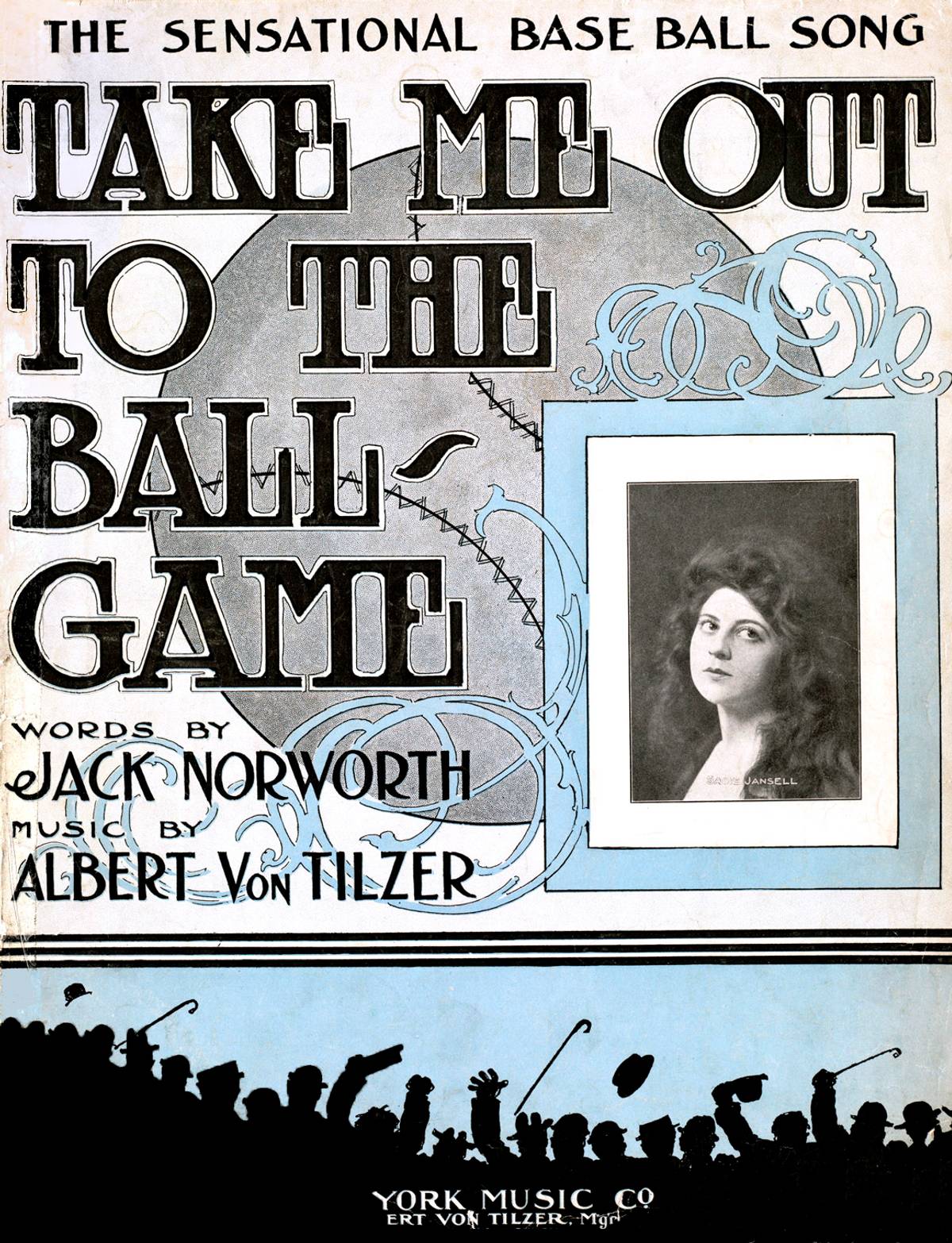No Opening Day Without Von Tilzer!
The Jewish Tin Pan Alley composer who wrote ‘Take Me Out to the Ball Game’ had never been to a ballgame



Every baseball fan knows that during the seventh inning stretch, the organ plays and the crowd stands up to sing “Take Me Out to the Ball Game.” But most don’t know that the man who wrote the music was the Jewish composer Albert Von Tilzer, and he had never attended a baseball game.
Baseball fans can sing the first couple of lines of the chorus by heart, but the full song is as follows:
Katie Casey was baseball mad.
Had the fever and had it bad;
Just to root for the home town crew,
Ev’ry sou Katie blew.
On a Saturday, her young beau
Called to see if she’d like to go,
To see a show but Miss Kate said,
“No, I’ll tell you what you can do.”
“Take me out to the ball game,
Take me out with the crowd.
Buy me some peanuts and cracker jack,
I don’t care if I never get back,
Let me root, root, root for the home team,
If they don’t win it’s a shame.
For it’s one, two, three strikes, you’re out,
At the old ball game.”
Katie Casey saw all the games,
Knew the players by their first names;
Told the umpire he was wrong,
All along good and strong.
When the score was just two to two,
Katie Casey knew what to do,
Just to cheer up the boys she knew,
She made the gang sing this song:
The song became a smash hit and brought Von Tilzer widespread fame. In 1908, Jack Norworth wrote the original lyrics on some scrap paper while on a subway ride to Manhattan. On the train, he spotted a sign announcing “Baseball Today – Polo Grounds.” He sketched out two verses about a girl named Katie Casey who had “baseball fever.” He gave the scrap lyrics to his writing partner, Albert Von Tilzer, who composed the music, which was then published by the New York Music Company. Early movie theaters featured it during intermission with the lyrics on the screen, encouraging the audience to sing the chorus. Before the year was over the song had become a hit, and it remained hugely popular through the following decades. Norworth wrote over 2,500 songs, including “Shine on Harvest Moon,” and several other baseball songs. But none is more famous than “Take Me Out to the Ball Game.”

In 1927, Norworth changed some lyrics and a second version appeared. This is the one that is still played and sung during the seventh inning stretch. Norworth finally attended his first Major League Baseball game on June 17, 1940, and saw the Brooklyn Dodgers defeat the Chicago Cubs 5 to 4. On the 50th anniversary of the song’s debut, Major League Baseball presented Norworth with a lifetime ballpark pass.
Albert Von Tilzer, the song’s composer, was born Albert Gumm in Indianapolis. One of six sons of Jacob Gumbinsky and Sarah Tilzer, immigrants from Poland, Albert’s father ran a shoe store in Goshen, Indiana, before moving to Indianapolis. The family was quite musical. Albert’s older brother Harry became a popular songwriter and partner in the music publishing company Shapiro, Bernstein and Von Tilzer, and helped his younger brother land a job at the company’s Chicago office. Albert also assumed the Von Tilzer name and became a prolific Tin Pan Alley songwriter.
Tin Pan Alley was both a cultural concept and a physical place. The physical place was a grouping of apartments, offices, rooms, and spaces located on West 28th Street between Fifth and Sixth avenues in Manhattan. Its ordinary appearance today belies the fact that at the turn of the 20th century, this block embodied a creative and commercial dynamism that had an enormous impact on American music.
It was Harry Von Tilzer who gave the place its appellation. He said that when he walked through the area, the sound of so many pianos being played sounded like people beating on tin pans. Another one of Harry’s creations was the Von Tilzer name itself. He took their mother’s maiden name and added the German nobility particle “Von” to make it sound classier. Four of the five Gumm brothers adopted it.
Albert had dropped out of high school to work in his father’s shoe store, but like Harry he also hoped to compose music. After working as a musical director for a vaudeville group, Albert was hired in 1899 as a staff pianist for the Chicago branch of Shapiro and Bernstein. In 1900 he moved to New York City, the center of the music publishing industry. In order to earn a living, Albert continued to work as a shoe salesman in a Brooklyn department store. Harry then joined Albert in New York, where he opened his own music publishing house, the Harry Von Tilzer Music Company. In 1903, Albert and his other brother Jack formed the York Music Company. From then on it published all of Albert Von Tilzer’s songs, most of which he wrote for individual vaudeville acts in collaboration with Jack Norworth.
“Take Me Out to the Ball Game” made Von Tilzer a pop music superstar. The song was such a success that he received a contract to tour the Orpheum vaudeville circuit in order to publicize it. Although neither Von Tilzer nor Norworth had ever been to a ballgame, the song captured the essence of one quite well. Students of music pointed out that the quarter-rest pause between “take” and “me” in the first measure of the chorus was the perfect spot for the “thwack” sound of a ball hitting a bat. By the 1920s, Von Tilzer was no longer writing for vaudeville but composing full scores for Broadway. He moved to Hollywood in 1930 to write songs for motion pictures, and retired there in the latter part of the decade.
Two highlights of Von Tilzer’s long career relate directly to his most popular song. On June 27, 1940, the Brooklyn Dodgers baseball club hosted a special day for him at their home park, Ebbets Field. And in 1949, MGM released the musical film Take Me Out to the Ball Game, starring Frank Sinatra, Gene Kelly, and Esther Williams, and in which Sinatra sang the title song, cementing its place in American folklore.
On the eve of the 1956 World Series, Albert Von Tilzer, now a sickly 78-year-old, lay in his Beverly Hills apartment watching television. The Brooklyn Dodgers and New York Yankees were playing, and Ed Sullivan was introducing some of baseball’s greatest stars on his weekly television show. In honor of the impending World Series, the band played “Take Me Out to the Ball Game.” After the show, Von Tilzer’s nurse turned off the television set and tucked him in for the evening. Sometime before morning on Oct. 1, 1956, Von Tilzer died in his sleep.
Albert Von Tilzer was in show business for half a century, and was a charter member of the Association of Songwriters, Composers, Authors, and Publishers (ASCAP), and the Songwriters Hall of Fame. Twenty-four of his songs sold more than 1 million copies. But he is best remembered for one song, the most beloved and well-known musical composition in all of American sports.
Robert Rockaway is professor emeritus at Tel Aviv University, and the author of But He Was Good to His Mother: The Lives and Crimes of Jewish Gangsters.